Upgrade Your Bathroom: Premium Soft & Absorbent Hand Towels
Elevating Commercial Hygiene and Comfort: The Strategic Importance of Premium hand towel Procurement
In the discerning B2B landscape, the selection of textile products, particularly the hand towel, extends far beyond simple utility. It embodies a commitment to guest experience, operational efficiency, and brand reputation. For sectors ranging from high-end hospitality to advanced healthcare facilities, the tactile quality, absorbency, and durability of a hand towel are critical performance indicators. This comprehensive guide delves into the technical specifications, manufacturing intricacies, and strategic advantages associated with premium commercial hand towels, empowering procurement professionals to make informed decisions that align with stringent industry demands.
We will explore the evolving market, dissect the rigorous production lifecycle, present key technical differentiators, and illustrate their impact through real-world application scenarios. Furthermore, this analysis will furnish decision-makers with a framework for vendor evaluation, custom solution development, and a clear understanding of the total cost of ownership (TCO) associated with superior textile investments.
Industry Trends and Market Dynamics in Commercial Textiles
The commercial textile industry is currently shaped by several convergent trends. Sustainability is paramount, driving demand for organically sourced materials and eco-friendly manufacturing processes. Businesses increasingly seek products certified by standards such as Oeko-Tex Standard 100, ensuring textiles are free from harmful substances. Furthermore, advancements in fiber technology are enhancing product attributes like quick-drying properties and antimicrobial resistance, crucial for hygiene-sensitive environments.
There's a growing appreciation for integrated textile solutions, where products like a premium face towel, robust bath mats, luxurious bath robe, and durable shower curtain are sourced from a single, reliable vendor to ensure consistency in quality and branding across an entire establishment. The market also exhibits a shift towards lighter, more absorbent fabrics that reduce laundry cycle times and associated energy costs, directly impacting operational expenditures.
Detailed Manufacturing Process Flow of a Commercial Hand Towel
The production of a high-quality hand towel is a multi-stage, precision-driven process. It begins with meticulous material selection and culminates in stringent quality control, ensuring compliance with commercial-grade specifications.
Raw Material Selection (e.g., Long-Staple Cotton)
Materials: Premium commercial hand towels typically utilize 100% long-staple cotton (e.g., Egyptian or Pima cotton) known for its superior fiber length, strength, and inherent softness. This choice is critical for absorbency and durability. Bamboo blends are also gaining traction for their sustainable profile and natural antimicrobial properties.
Yarn Spinning
Process: Selected cotton fibers undergo carding and combing to align fibers and remove impurities, followed by spinning into high-tensile strength yarns. Open-end or ring-spun techniques are employed, impacting yarn strength and softness. The choice of ply (single or double) influences the towel's plushness and longevity.
Weaving (Terry Loop Construction)
Process: The spun yarns are woven on specialized shuttleless looms (e.g., air-jet or rapier looms) into a terry fabric. This involves creating loops on both sides of the base fabric, significantly increasing surface area for maximum absorbency. Pile height and loop density are precisely controlled, directly impacting the towel's Grams per Square Meter (GSM).
Dyeing and Bleaching
Process: Fabric undergoes desizing, scouring, and bleaching to remove natural waxes and impurities, preparing it for dyeing. Reactive dyes are commonly used for their excellent colorfastness, crucial for commercial laundering. Precision dyeing ensures uniform color and minimal fade over extended service life.
Finishing and Hemming
Process: After dyeing, the fabric is softened, dried, and heat-set to stabilize dimensions and enhance hand-feel. Individual towels are then cut and hemmed. Double-stitched hems are standard for commercial applications, preventing unraveling and extending the product's service life.
Quality Control & Testing
Standards: Each batch undergoes rigorous testing to comply with industry standards such as ISO 9001 for quality management and ISO 14001 for environmental management. Key performance tests include absorbency (e.g., AATCC Test Method 79), tensile strength (e.g., ASTM D5034), colorfastness to washing (e.g., ISO 105 C06), and dimensional stability. Products are often certified by third-party organizations like Oeko-Tex Standard 100 for textile safety.
Target Industries: This rigorous process ensures the hand towel meets the demands of high-volume usage in sectors like hospitality (hotels, resorts), healthcare (hospitals, clinics), spas & wellness centers, and corporate facilities. Its robust construction ensures an extended service life, often exceeding 200 wash cycles under commercial conditions, significantly outperforming consumer-grade alternatives.
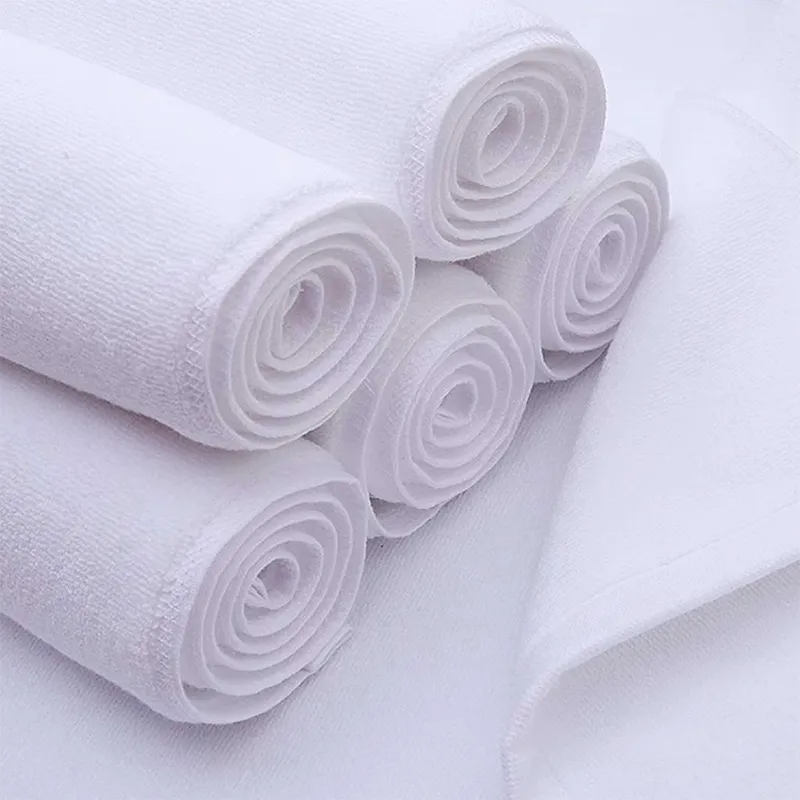
Technical Specifications and Performance Parameters
Understanding the key technical parameters of a commercial hand towel is crucial for procurement, ensuring optimal performance and value. These specifications directly influence the towel's absorbency, durability, and comfort.
| Parameter | Description | Typical Range for Premium Commercial Grade | Measurement Standard |
|---|---|---|---|
| Material Composition | Fiber type, blend percentage | 100% Ring-Spun Long-Staple Cotton | Fiber Identification (FTIR, Microscopy) |
| Grams per Square Meter (GSM) | Weight of fabric per square meter; indicates density and plushness | 450 - 650 GSM | ASTM D3776 / ISO 3801 |
| Absorbency Rate | Time taken for a drop of water to be absorbed | < 5 seconds (after initial washes) | AATCC Test Method 79 |
| Tensile Strength | Resistance to tearing under tension | Warp: > 250N, Weft: > 200N | ASTM D5034 / ISO 13934-1 |
| Colorfastness to Washing | Resistance of color to fading or bleeding during washing | Change: Grade 4-5, Staining: Grade 4-5 | ISO 105 C06 |
| Dimensional Stability | Shrinkage after washing | < 5% | ISO 6330 / AATCC 135 |
| Pile Retention | Resistance of loops to pulling or snagging | Minimal shedding after 50+ washes | In-house Durability Test |
| pH Value | Textile pH, critical for skin compatibility | 4.0 - 7.5 (Oeko-Tex Standard 100 compliant) | ISO 3071 |
These parameters ensure that a commercial hand towel not only feels luxurious but also withstands the rigors of industrial laundering, maintaining its integrity, absorbency, and aesthetic appeal over an extended lifespan. The high GSM (typically 450-650 for premium towels) directly correlates with the towel's plushness and ability to absorb moisture efficiently. Long-staple cotton guarantees minimal linting and superior loop retention, crucial for maintaining appearance and performance.
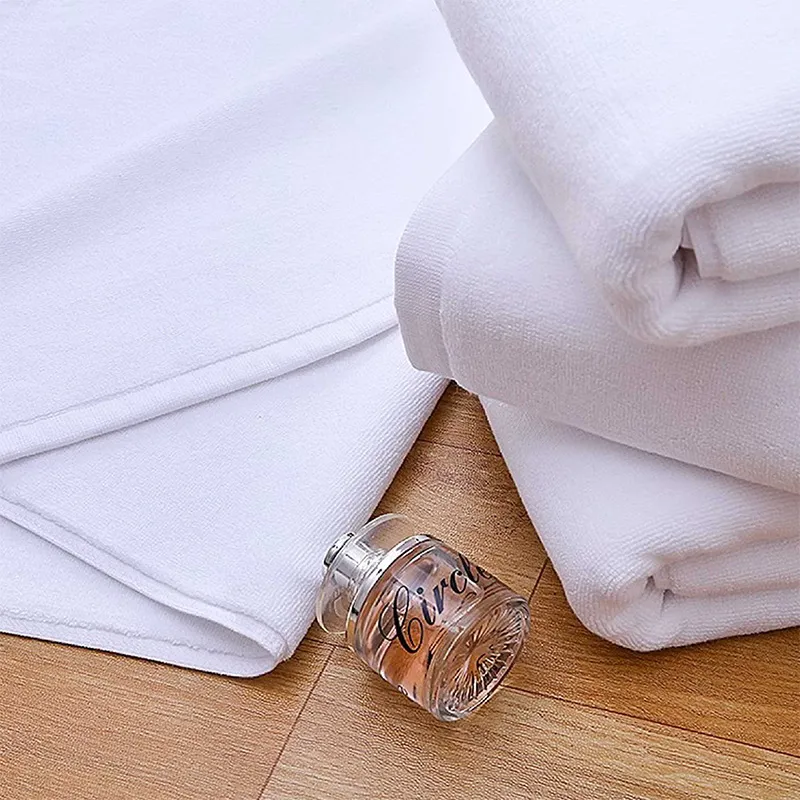
Technical Advantages in Typical Application Scenarios
The selection of a high-performance hand towel offers significant operational and reputational advantages across various B2B sectors:
- Energy Saving & Operational Efficiency: Advanced weaving techniques and high-quality cotton fibers enable towels to dry faster, both in use and during commercial laundering cycles. This translates to reduced energy consumption for dryers and faster turnaround times, optimizing laundry operations. For instance, studies indicate that fast-drying towels can reduce industrial drying times by up to 15-20%, leading to substantial energy cost savings over a year.
- Enhanced Durability & Service Life: Reinforced double-stitched hems and high-tensile strength yarns prevent fraying and tearing, even after hundreds of washes. This superior construction leads to a significantly longer service life compared to standard towels, reducing replacement frequency and procurement costs. Premium commercial towels are engineered to withstand the abrasive conditions of industrial washing machines and harsh detergents.
- Superior Absorbency & User Experience: The dense terry loops and high GSM contribute to immediate and efficient moisture absorption, providing a luxurious feel for guests and clients. This directly enhances customer satisfaction in hospitality and spa settings, reinforcing brand quality.
- Color Retention & Aesthetic Integrity: Utilizing reactive dyes and advanced dyeing processes ensures exceptional colorfastness. This prevents premature fading or color bleeding, maintaining a vibrant and professional appearance throughout the towel's lifespan, even with repeated exposure to disinfectants and high-temperature washes. This is particularly important for branded textiles where color consistency is paramount.
- Hygiene & Compliance: Textiles certified by Oeko-Tex Standard 100 assure that no harmful substances are present. For healthcare environments, specialized treatments (e.g., antimicrobial finishes) can be integrated during manufacturing to inhibit bacterial growth, aligning with stringent hygiene protocols.
Target Industries & Advantages:
- Hospitality (Hotels, Resorts): Superior guest experience, reduced laundry costs due to fast drying and durability, maintained brand image through consistent quality.
- Healthcare (Clinics, Hospitals): Enhanced hygiene, compliance with safety standards, durability under rigorous sterilization.
- Spas & Wellness: Luxurious feel, high absorbency for client comfort, long-term aesthetic appeal.
- Gyms & Fitness Centers: Robustness for high-frequency use, quick-drying properties, effective moisture management for users.
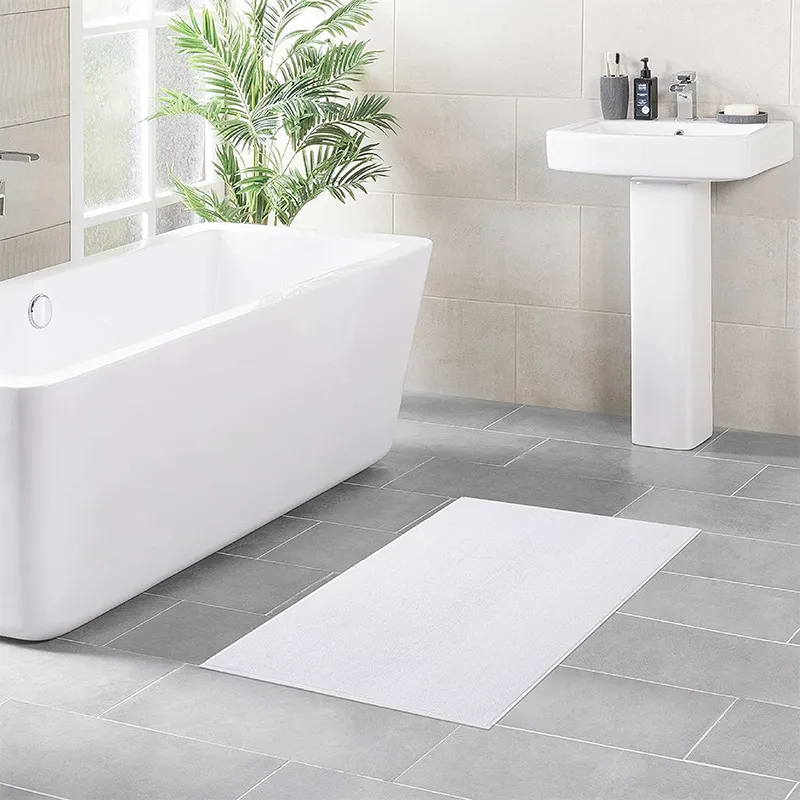
Application Scenarios and Case Studies
The versatility and robustness of commercial hand towels make them indispensable across a spectrum of professional environments. Here are illustrative scenarios and simulated case studies demonstrating their impact:
Scenario 1: Luxury Hotel Chain - "The Grandeur Suites"
The Grandeur Suites, a five-star hotel chain with properties across major metropolitan areas, sought to elevate guest satisfaction and reduce operational costs associated with linen replacement. Their previous supplier provided towels with lower GSM and inconsistent colorfastness, leading to frequent complaints about thinness and premature fading after only 50-70 wash cycles.
- Solution Implemented: Transitioned to a premium 550 GSM, 100% long-staple cotton hand towel with double-stitched hems and reactive dye technology.
- Outcome:
- Guest Feedback: A 25% increase in positive guest reviews mentioning "luxurious and soft towels" within the first six months.
- Durability: Towel service life extended to an average of 180-200 washes, reducing annual replacement costs by an estimated 18%.
- Operational Efficiency: Improved drying times for the more absorbent towels contributed to a 7% reduction in laundry utility costs.
Scenario 2: High-Volume Medical Clinic - "MedCare Diagnostics"
MedCare Diagnostics operates a busy facility requiring sterile and highly durable textiles for patient care and staff use. Their primary concerns were maintaining strict hygiene standards, preventing cross-contamination, and ensuring towels could withstand daily high-temperature wash cycles with hospital-grade disinfectants without degradation.
- Solution Implemented: Adopted a specialized 500 GSM antimicrobial-treated hand towel, Oeko-Tex Standard 100 certified, with reinforced construction for industrial laundering.
- Outcome:
- Hygiene Assurance: Antimicrobial properties provided an additional layer of protection, crucial for sensitive medical environments.
- Longevity: The towels maintained structural integrity and absorbency for over 250 wash cycles, significantly reducing the frequency and cost of reordering.
- Compliance: The Oeko-Tex certification provided independent verification of safety, aligning with clinic's health and safety protocols.
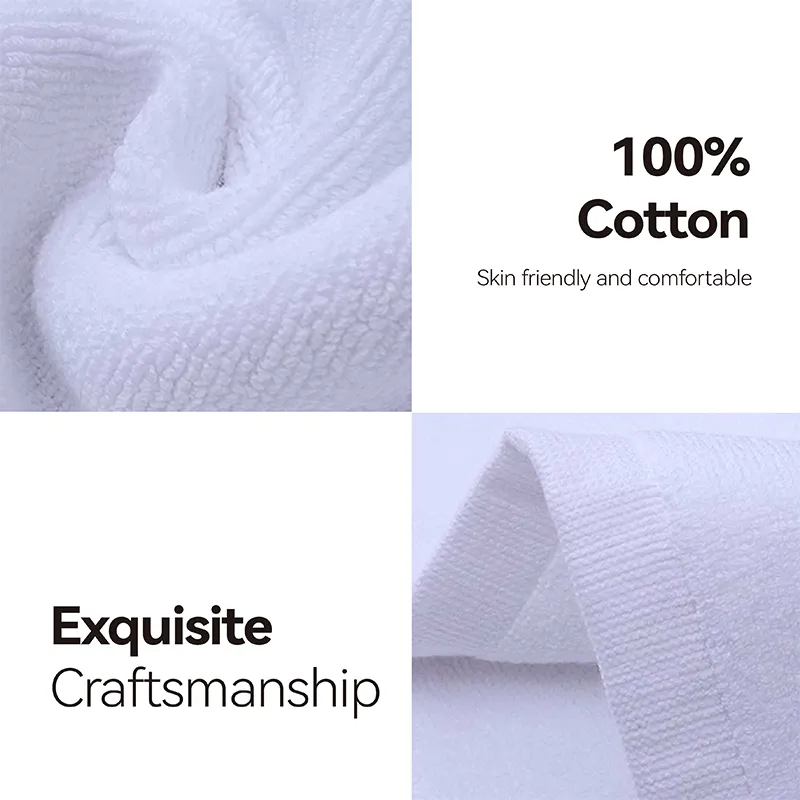
Vendor Comparison and Selection Criteria
Choosing the right textile vendor for your commercial hand towel needs is a strategic decision impacting quality, cost, and supply chain reliability. A thorough evaluation involves several key criteria beyond just unit price.
| Criterion | Importance Level | Key Considerations / Metrics |
|---|---|---|
| Product Quality & Specifications | High | GSM, Material (Long-staple cotton), Weave Type, Absorbency Rate, Tensile Strength, Colorfastness, Dimensional Stability. Request physical samples for evaluation. |
| Certifications & Compliance | Critical | Oeko-Tex Standard 100, ISO 9001, ISO 14001, GOTS (for organic cotton). Verifies environmental and safety standards. |
| Customization Capabilities | Medium-High | Ability to customize size, color (Pantone matching), weave patterns, embroidered logos. Minimum Order Quantities (MOQ). |
| Lead Time & Fulfillment | High | Production lead times, shipping options, inventory management capabilities, ability to handle urgent orders. |
| Pricing & Total Cost of Ownership (TCO) | High | Unit cost, volume discounts, shipping costs, estimated service life (impacts replacement frequency), energy savings from faster drying. |
| After-Sales Support & Warranty | Medium | Return policy, defect warranty, responsiveness of customer service, dedicated account manager. |
| Reputation & References | High | Client testimonials, case studies, years in business, industry recognition, partnerships with major brands. |
A careful comparative analysis using these criteria ensures that the chosen vendor can not only supply high-quality hand towels but also act as a reliable, long-term partner capable of meeting evolving business needs. Prioritizing quality and durability, despite potentially higher upfront costs, consistently yields lower TCO due to reduced replacement cycles and operational efficiencies.
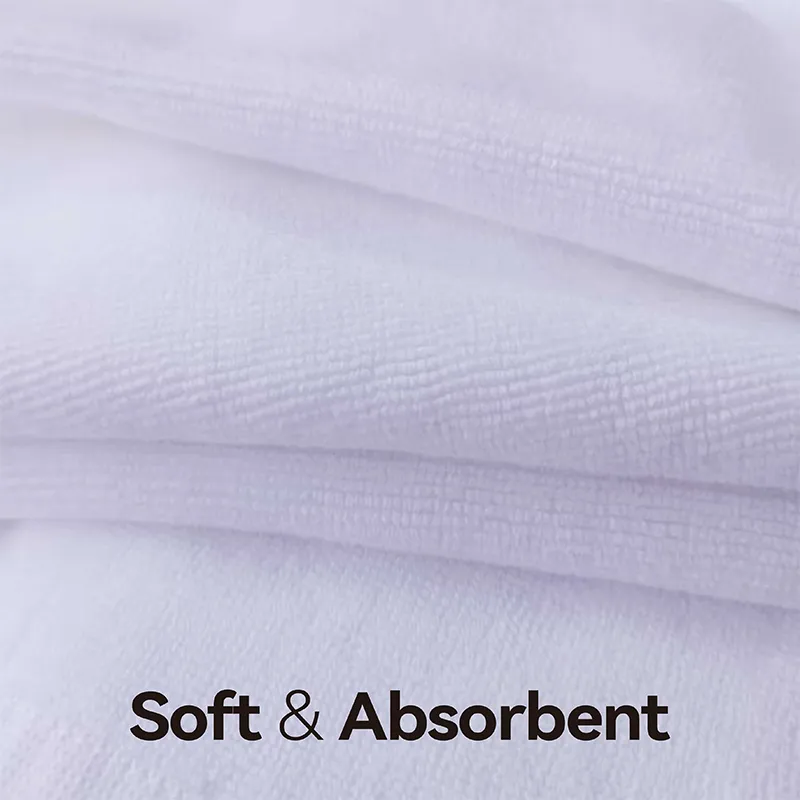
Customized Solutions for Distinct Brand Identity
In the competitive commercial landscape, a standard hand towel often falls short of establishing a unique brand identity. Leading textile manufacturers offer extensive customization options to align products perfectly with a client's specific aesthetic and functional requirements. These solutions help reinforce brand messaging, enhance guest perception, and contribute to a cohesive visual experience.
- Material Blends: Beyond 100% cotton, customized blends can incorporate bamboo for enhanced softness and antimicrobial properties, or microfibers for ultra-fast drying in specific applications like high-end gyms.
- Bespoke Sizes and GSM: While standard sizes exist, facilities with unique requirements (e.g., custom washroom dimensions, specific usage protocols) can commission bespoke dimensions. Similarly, GSM can be adjusted to achieve a desired balance of plushness and dry time.
- Custom Colors and Dyeing: Manufacturers can match precise Pantone colors, ensuring brand consistency across all textile products, from the hand towel to the bath robe. Advanced dyeing techniques ensure colorfastness even with unique hues.
- Logo Embroidery & Weaving: Integrating corporate logos or monograms through high-quality embroidery or jacquard weaving adds a touch of exclusivity and professionalism. This transforms a functional item into a subtle branding tool.
- Special Finishes: Options include antimicrobial treatments for healthcare and spa environments, low-lint finishes for superior aesthetics, or quick-dry treatments to further reduce laundry operational costs.
Engaging with manufacturers that possess robust R&D capabilities and flexible production lines is crucial for successful customized solutions. Minimum Order Quantities (MOQs) for bespoke orders typically range from 500 to 5,000 units, depending on the complexity of customization, making these solutions ideal for medium to large-scale commercial operations committed to differentiating their brand.
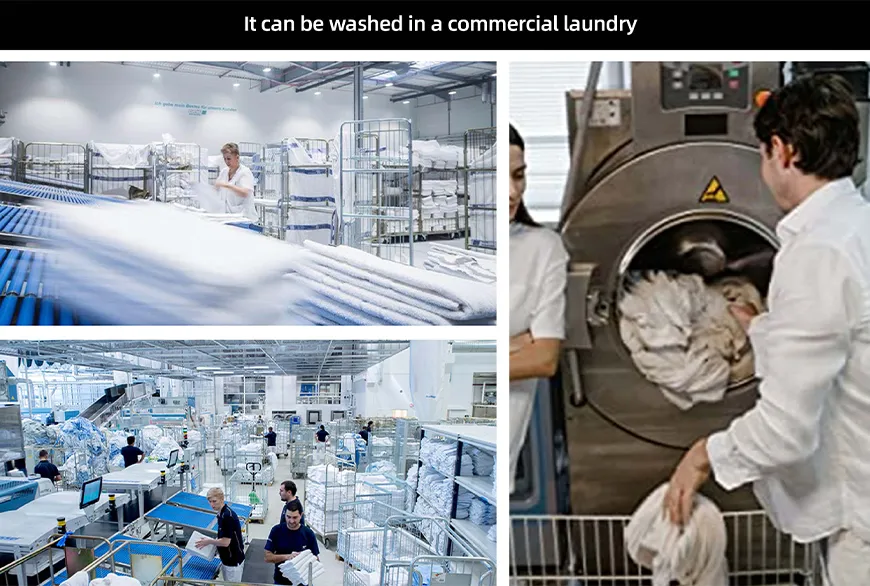
Trustworthiness, Commitment, and Support
Establishing a long-term partnership with a textile supplier hinges on their demonstrated trustworthiness and commitment to customer satisfaction. Key indicators include transparent policies, comprehensive support, and robust quality assurances.
Frequently Asked Questions (FAQ)
Q: What is the typical service life of a commercial hand towel?
A: Premium commercial hand towel products, when properly cared for and laundered, are engineered to withstand 150-250 industrial wash cycles while maintaining their performance and aesthetic integrity. This is a significant factor in TCO.
Q: Are your towels Oeko-Tex certified?
A: Yes, our commercial towels are typically Oeko-Tex Standard 100 certified, assuring that they are free from harmful substances and safe for human contact. This certification is a cornerstone of our commitment to safety and quality.
Q: Can you accommodate custom sizes and colors for large orders?
A: Absolutely. We specialize in customized solutions, including bespoke sizes, specific GSMs, and Pantone color matching, with competitive MOQs. Our design team works closely with clients to realize their precise branding requirements.
Q: What is the lead time for a typical bulk order?
A: For standard products, lead times generally range from 4-6 weeks from order confirmation. Custom orders may require 8-12 weeks, depending on complexity and production schedules. We maintain transparency and communicate closely on all timelines.
Lead Time & Fulfillment
Our streamlined supply chain and robust manufacturing capabilities ensure efficient order processing and delivery. Standard bulk orders are typically fulfilled within 4-6 weeks. For urgent requirements or complex custom solutions, we offer expedited options and work closely with clients to manage expectations and logistics, leveraging global shipping partners for reliable worldwide delivery.
Warranty Commitments
We stand behind the quality of our commercial textiles. All our products, including every hand towel, are backed by a comprehensive warranty covering manufacturing defects and performance inconsistencies for a defined period or number of wash cycles. Specific warranty details are provided with each quotation, reflecting our confidence in the durability and quality of our products.
Customer Support & After-Sales Service
Our commitment extends beyond the point of sale. Dedicated account managers provide personalized support, from initial consultation and sample provision to post-delivery assistance. Our technical support team is available to address any questions regarding product performance, care instructions, or reordering. We value long-term partnerships and prioritize responsive, knowledgeable customer service.
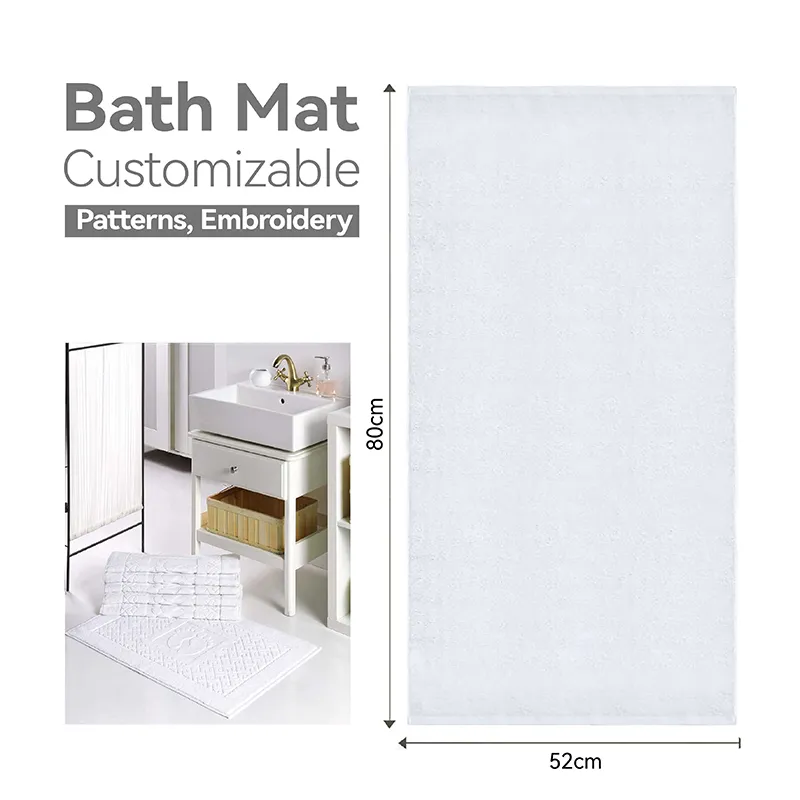
Conclusion: Strategic Procurement for Lasting Value
The procurement of commercial hand towels is a nuanced process that, when executed strategically, yields substantial returns in operational efficiency, customer satisfaction, and brand integrity. By understanding the detailed manufacturing processes, technical specifications, and the impact of quality on total cost of ownership, B2B decision-makers can make informed choices that elevate their establishments. Investing in premium hand towel solutions is not merely an expense but a critical investment in sustained quality and guest experience.
As industry trends lean towards sustainability and enhanced hygiene, partnering with a manufacturer committed to rigorous quality control, ethical practices, and advanced textile technology becomes paramount. This ensures not only compliance with evolving standards but also a future-proof textile inventory that continually reinforces your brand's commitment to excellence.
References
- ASTM International. (2020). ASTM D5034 / D5034M-18: Standard Test Method for Breaking Strength and Elongation of Textile Fabrics (Grab Test).
- International Organization for Standardization. (2017). ISO 105-C06: Textiles - Tests for colour fastness - Part C06: Colour fastness to domestic and commercial laundering.
- International Organization for Standardization. (2019). ISO 9001: Quality management systems - Requirements.
- Oeko-Tex International. (2023). Oeko-Tex Standard 100: Testing for harmful substances.
- American Association of Textile Chemists and Colorists. (2018). AATCC Test Method 79: Absorbency of Textile Materials.
- European Association for Textile Polypropylene. (2021). Review of industrial laundry practices and their impact on textile durability.
-
Garment Washed Sheets Color Retention Prevents Fading After WashesNewsNov.14, 2025
-
Charcoal Bamboo Sheets Moisture-Wicking Property Enhances Sleep ComfortNewsNov.12, 2025
-
High Quality Satin Sheets Soft Touch Improves Hotel Guest ExperienceNewsNov.12, 2025
-
Poly Cotton Sheets Breathable Weave Reduces Skin Irritation For PatientsNewsNov.12, 2025
-
Microfiber Sheet Stain Resistant Feature Eases Hotel HousekeepingNewsNov.12, 2025
-
Polyester Cotton Bedding Durable Fabric Withstands Frequent Hotel WashesNewsNov.12, 2025
-
Microfiber Pillow Filling Even Distribution Prevents LumpingNewsNov.03, 2025
Upgrade Your Bathroom: Premium Soft & Absorbent Hand Towels
Elevating Commercial Hygiene and Comfort: The Strategic Importance of Premium hand towel Procurement
In the discerning B2B landscape, the selection of textile products, particularly the hand towel, extends far beyond simple utility. It embodies a commitment to guest experience, operational efficiency, and brand reputation. For sectors ranging from high-end hospitality to advanced healthcare facilities, the tactile quality, absorbency, and durability of a hand towel are critical performance indicators. This comprehensive guide delves into the technical specifications, manufacturing intricacies, and strategic advantages associated with premium commercial hand towels, empowering procurement professionals to make informed decisions that align with stringent industry demands.
We will explore the evolving market, dissect the rigorous production lifecycle, present key technical differentiators, and illustrate their impact through real-world application scenarios. Furthermore, this analysis will furnish decision-makers with a framework for vendor evaluation, custom solution development, and a clear understanding of the total cost of ownership (TCO) associated with superior textile investments.
Industry Trends and Market Dynamics in Commercial Textiles
The commercial textile industry is currently shaped by several convergent trends. Sustainability is paramount, driving demand for organically sourced materials and eco-friendly manufacturing processes. Businesses increasingly seek products certified by standards such as Oeko-Tex Standard 100, ensuring textiles are free from harmful substances. Furthermore, advancements in fiber technology are enhancing product attributes like quick-drying properties and antimicrobial resistance, crucial for hygiene-sensitive environments.
There's a growing appreciation for integrated textile solutions, where products like a premium face towel, robust bath mats, luxurious bath robe, and durable shower curtain are sourced from a single, reliable vendor to ensure consistency in quality and branding across an entire establishment. The market also exhibits a shift towards lighter, more absorbent fabrics that reduce laundry cycle times and associated energy costs, directly impacting operational expenditures.
Detailed Manufacturing Process Flow of a Commercial Hand Towel
The production of a high-quality hand towel is a multi-stage, precision-driven process. It begins with meticulous material selection and culminates in stringent quality control, ensuring compliance with commercial-grade specifications.
Raw Material Selection (e.g., Long-Staple Cotton)
Materials: Premium commercial hand towels typically utilize 100% long-staple cotton (e.g., Egyptian or Pima cotton) known for its superior fiber length, strength, and inherent softness. This choice is critical for absorbency and durability. Bamboo blends are also gaining traction for their sustainable profile and natural antimicrobial properties.
Yarn Spinning
Process: Selected cotton fibers undergo carding and combing to align fibers and remove impurities, followed by spinning into high-tensile strength yarns. Open-end or ring-spun techniques are employed, impacting yarn strength and softness. The choice of ply (single or double) influences the towel's plushness and longevity.
Weaving (Terry Loop Construction)
Process: The spun yarns are woven on specialized shuttleless looms (e.g., air-jet or rapier looms) into a terry fabric. This involves creating loops on both sides of the base fabric, significantly increasing surface area for maximum absorbency. Pile height and loop density are precisely controlled, directly impacting the towel's Grams per Square Meter (GSM).
Dyeing and Bleaching
Process: Fabric undergoes desizing, scouring, and bleaching to remove natural waxes and impurities, preparing it for dyeing. Reactive dyes are commonly used for their excellent colorfastness, crucial for commercial laundering. Precision dyeing ensures uniform color and minimal fade over extended service life.
Finishing and Hemming
Process: After dyeing, the fabric is softened, dried, and heat-set to stabilize dimensions and enhance hand-feel. Individual towels are then cut and hemmed. Double-stitched hems are standard for commercial applications, preventing unraveling and extending the product's service life.
Quality Control & Testing
Standards: Each batch undergoes rigorous testing to comply with industry standards such as ISO 9001 for quality management and ISO 14001 for environmental management. Key performance tests include absorbency (e.g., AATCC Test Method 79), tensile strength (e.g., ASTM D5034), colorfastness to washing (e.g., ISO 105 C06), and dimensional stability. Products are often certified by third-party organizations like Oeko-Tex Standard 100 for textile safety.
Target Industries: This rigorous process ensures the hand towel meets the demands of high-volume usage in sectors like hospitality (hotels, resorts), healthcare (hospitals, clinics), spas & wellness centers, and corporate facilities. Its robust construction ensures an extended service life, often exceeding 200 wash cycles under commercial conditions, significantly outperforming consumer-grade alternatives.

Technical Specifications and Performance Parameters
Understanding the key technical parameters of a commercial hand towel is crucial for procurement, ensuring optimal performance and value. These specifications directly influence the towel's absorbency, durability, and comfort.
| Parameter | Description | Typical Range for Premium Commercial Grade | Measurement Standard |
|---|---|---|---|
| Material Composition | Fiber type, blend percentage | 100% Ring-Spun Long-Staple Cotton | Fiber Identification (FTIR, Microscopy) |
| Grams per Square Meter (GSM) | Weight of fabric per square meter; indicates density and plushness | 450 - 650 GSM | ASTM D3776 / ISO 3801 |
| Absorbency Rate | Time taken for a drop of water to be absorbed | < 5 seconds (after initial washes) | AATCC Test Method 79 |
| Tensile Strength | Resistance to tearing under tension | Warp: > 250N, Weft: > 200N | ASTM D5034 / ISO 13934-1 |
| Colorfastness to Washing | Resistance of color to fading or bleeding during washing | Change: Grade 4-5, Staining: Grade 4-5 | ISO 105 C06 |
| Dimensional Stability | Shrinkage after washing | < 5% | ISO 6330 / AATCC 135 |
| Pile Retention | Resistance of loops to pulling or snagging | Minimal shedding after 50+ washes | In-house Durability Test |
| pH Value | Textile pH, critical for skin compatibility | 4.0 - 7.5 (Oeko-Tex Standard 100 compliant) | ISO 3071 |
These parameters ensure that a commercial hand towel not only feels luxurious but also withstands the rigors of industrial laundering, maintaining its integrity, absorbency, and aesthetic appeal over an extended lifespan. The high GSM (typically 450-650 for premium towels) directly correlates with the towel's plushness and ability to absorb moisture efficiently. Long-staple cotton guarantees minimal linting and superior loop retention, crucial for maintaining appearance and performance.

Technical Advantages in Typical Application Scenarios
The selection of a high-performance hand towel offers significant operational and reputational advantages across various B2B sectors:
- Energy Saving & Operational Efficiency: Advanced weaving techniques and high-quality cotton fibers enable towels to dry faster, both in use and during commercial laundering cycles. This translates to reduced energy consumption for dryers and faster turnaround times, optimizing laundry operations. For instance, studies indicate that fast-drying towels can reduce industrial drying times by up to 15-20%, leading to substantial energy cost savings over a year.
- Enhanced Durability & Service Life: Reinforced double-stitched hems and high-tensile strength yarns prevent fraying and tearing, even after hundreds of washes. This superior construction leads to a significantly longer service life compared to standard towels, reducing replacement frequency and procurement costs. Premium commercial towels are engineered to withstand the abrasive conditions of industrial washing machines and harsh detergents.
- Superior Absorbency & User Experience: The dense terry loops and high GSM contribute to immediate and efficient moisture absorption, providing a luxurious feel for guests and clients. This directly enhances customer satisfaction in hospitality and spa settings, reinforcing brand quality.
- Color Retention & Aesthetic Integrity: Utilizing reactive dyes and advanced dyeing processes ensures exceptional colorfastness. This prevents premature fading or color bleeding, maintaining a vibrant and professional appearance throughout the towel's lifespan, even with repeated exposure to disinfectants and high-temperature washes. This is particularly important for branded textiles where color consistency is paramount.
- Hygiene & Compliance: Textiles certified by Oeko-Tex Standard 100 assure that no harmful substances are present. For healthcare environments, specialized treatments (e.g., antimicrobial finishes) can be integrated during manufacturing to inhibit bacterial growth, aligning with stringent hygiene protocols.
Target Industries & Advantages:
- Hospitality (Hotels, Resorts): Superior guest experience, reduced laundry costs due to fast drying and durability, maintained brand image through consistent quality.
- Healthcare (Clinics, Hospitals): Enhanced hygiene, compliance with safety standards, durability under rigorous sterilization.
- Spas & Wellness: Luxurious feel, high absorbency for client comfort, long-term aesthetic appeal.
- Gyms & Fitness Centers: Robustness for high-frequency use, quick-drying properties, effective moisture management for users.

Application Scenarios and Case Studies
The versatility and robustness of commercial hand towels make them indispensable across a spectrum of professional environments. Here are illustrative scenarios and simulated case studies demonstrating their impact:
Scenario 1: Luxury Hotel Chain - "The Grandeur Suites"
The Grandeur Suites, a five-star hotel chain with properties across major metropolitan areas, sought to elevate guest satisfaction and reduce operational costs associated with linen replacement. Their previous supplier provided towels with lower GSM and inconsistent colorfastness, leading to frequent complaints about thinness and premature fading after only 50-70 wash cycles.
- Solution Implemented: Transitioned to a premium 550 GSM, 100% long-staple cotton hand towel with double-stitched hems and reactive dye technology.
- Outcome:
- Guest Feedback: A 25% increase in positive guest reviews mentioning "luxurious and soft towels" within the first six months.
- Durability: Towel service life extended to an average of 180-200 washes, reducing annual replacement costs by an estimated 18%.
- Operational Efficiency: Improved drying times for the more absorbent towels contributed to a 7% reduction in laundry utility costs.
Scenario 2: High-Volume Medical Clinic - "MedCare Diagnostics"
MedCare Diagnostics operates a busy facility requiring sterile and highly durable textiles for patient care and staff use. Their primary concerns were maintaining strict hygiene standards, preventing cross-contamination, and ensuring towels could withstand daily high-temperature wash cycles with hospital-grade disinfectants without degradation.
- Solution Implemented: Adopted a specialized 500 GSM antimicrobial-treated hand towel, Oeko-Tex Standard 100 certified, with reinforced construction for industrial laundering.
- Outcome:
- Hygiene Assurance: Antimicrobial properties provided an additional layer of protection, crucial for sensitive medical environments.
- Longevity: The towels maintained structural integrity and absorbency for over 250 wash cycles, significantly reducing the frequency and cost of reordering.
- Compliance: The Oeko-Tex certification provided independent verification of safety, aligning with clinic's health and safety protocols.

Vendor Comparison and Selection Criteria
Choosing the right textile vendor for your commercial hand towel needs is a strategic decision impacting quality, cost, and supply chain reliability. A thorough evaluation involves several key criteria beyond just unit price.
| Criterion | Importance Level | Key Considerations / Metrics |
|---|---|---|
| Product Quality & Specifications | High | GSM, Material (Long-staple cotton), Weave Type, Absorbency Rate, Tensile Strength, Colorfastness, Dimensional Stability. Request physical samples for evaluation. |
| Certifications & Compliance | Critical | Oeko-Tex Standard 100, ISO 9001, ISO 14001, GOTS (for organic cotton). Verifies environmental and safety standards. |
| Customization Capabilities | Medium-High | Ability to customize size, color (Pantone matching), weave patterns, embroidered logos. Minimum Order Quantities (MOQ). |
| Lead Time & Fulfillment | High | Production lead times, shipping options, inventory management capabilities, ability to handle urgent orders. |
| Pricing & Total Cost of Ownership (TCO) | High | Unit cost, volume discounts, shipping costs, estimated service life (impacts replacement frequency), energy savings from faster drying. |
| After-Sales Support & Warranty | Medium | Return policy, defect warranty, responsiveness of customer service, dedicated account manager. |
| Reputation & References | High | Client testimonials, case studies, years in business, industry recognition, partnerships with major brands. |
A careful comparative analysis using these criteria ensures that the chosen vendor can not only supply high-quality hand towels but also act as a reliable, long-term partner capable of meeting evolving business needs. Prioritizing quality and durability, despite potentially higher upfront costs, consistently yields lower TCO due to reduced replacement cycles and operational efficiencies.

Customized Solutions for Distinct Brand Identity
In the competitive commercial landscape, a standard hand towel often falls short of establishing a unique brand identity. Leading textile manufacturers offer extensive customization options to align products perfectly with a client's specific aesthetic and functional requirements. These solutions help reinforce brand messaging, enhance guest perception, and contribute to a cohesive visual experience.
- Material Blends: Beyond 100% cotton, customized blends can incorporate bamboo for enhanced softness and antimicrobial properties, or microfibers for ultra-fast drying in specific applications like high-end gyms.
- Bespoke Sizes and GSM: While standard sizes exist, facilities with unique requirements (e.g., custom washroom dimensions, specific usage protocols) can commission bespoke dimensions. Similarly, GSM can be adjusted to achieve a desired balance of plushness and dry time.
- Custom Colors and Dyeing: Manufacturers can match precise Pantone colors, ensuring brand consistency across all textile products, from the hand towel to the bath robe. Advanced dyeing techniques ensure colorfastness even with unique hues.
- Logo Embroidery & Weaving: Integrating corporate logos or monograms through high-quality embroidery or jacquard weaving adds a touch of exclusivity and professionalism. This transforms a functional item into a subtle branding tool.
- Special Finishes: Options include antimicrobial treatments for healthcare and spa environments, low-lint finishes for superior aesthetics, or quick-dry treatments to further reduce laundry operational costs.
Engaging with manufacturers that possess robust R&D capabilities and flexible production lines is crucial for successful customized solutions. Minimum Order Quantities (MOQs) for bespoke orders typically range from 500 to 5,000 units, depending on the complexity of customization, making these solutions ideal for medium to large-scale commercial operations committed to differentiating their brand.

Trustworthiness, Commitment, and Support
Establishing a long-term partnership with a textile supplier hinges on their demonstrated trustworthiness and commitment to customer satisfaction. Key indicators include transparent policies, comprehensive support, and robust quality assurances.
Frequently Asked Questions (FAQ)
Q: What is the typical service life of a commercial hand towel?
A: Premium commercial hand towel products, when properly cared for and laundered, are engineered to withstand 150-250 industrial wash cycles while maintaining their performance and aesthetic integrity. This is a significant factor in TCO.
Q: Are your towels Oeko-Tex certified?
A: Yes, our commercial towels are typically Oeko-Tex Standard 100 certified, assuring that they are free from harmful substances and safe for human contact. This certification is a cornerstone of our commitment to safety and quality.
Q: Can you accommodate custom sizes and colors for large orders?
A: Absolutely. We specialize in customized solutions, including bespoke sizes, specific GSMs, and Pantone color matching, with competitive MOQs. Our design team works closely with clients to realize their precise branding requirements.
Q: What is the lead time for a typical bulk order?
A: For standard products, lead times generally range from 4-6 weeks from order confirmation. Custom orders may require 8-12 weeks, depending on complexity and production schedules. We maintain transparency and communicate closely on all timelines.
Lead Time & Fulfillment
Our streamlined supply chain and robust manufacturing capabilities ensure efficient order processing and delivery. Standard bulk orders are typically fulfilled within 4-6 weeks. For urgent requirements or complex custom solutions, we offer expedited options and work closely with clients to manage expectations and logistics, leveraging global shipping partners for reliable worldwide delivery.
Warranty Commitments
We stand behind the quality of our commercial textiles. All our products, including every hand towel, are backed by a comprehensive warranty covering manufacturing defects and performance inconsistencies for a defined period or number of wash cycles. Specific warranty details are provided with each quotation, reflecting our confidence in the durability and quality of our products.
Customer Support & After-Sales Service
Our commitment extends beyond the point of sale. Dedicated account managers provide personalized support, from initial consultation and sample provision to post-delivery assistance. Our technical support team is available to address any questions regarding product performance, care instructions, or reordering. We value long-term partnerships and prioritize responsive, knowledgeable customer service.

Conclusion: Strategic Procurement for Lasting Value
The procurement of commercial hand towels is a nuanced process that, when executed strategically, yields substantial returns in operational efficiency, customer satisfaction, and brand integrity. By understanding the detailed manufacturing processes, technical specifications, and the impact of quality on total cost of ownership, B2B decision-makers can make informed choices that elevate their establishments. Investing in premium hand towel solutions is not merely an expense but a critical investment in sustained quality and guest experience.
As industry trends lean towards sustainability and enhanced hygiene, partnering with a manufacturer committed to rigorous quality control, ethical practices, and advanced textile technology becomes paramount. This ensures not only compliance with evolving standards but also a future-proof textile inventory that continually reinforces your brand's commitment to excellence.
References
- ASTM International. (2020). ASTM D5034 / D5034M-18: Standard Test Method for Breaking Strength and Elongation of Textile Fabrics (Grab Test).
- International Organization for Standardization. (2017). ISO 105-C06: Textiles - Tests for colour fastness - Part C06: Colour fastness to domestic and commercial laundering.
- International Organization for Standardization. (2019). ISO 9001: Quality management systems - Requirements.
- Oeko-Tex International. (2023). Oeko-Tex Standard 100: Testing for harmful substances.
- American Association of Textile Chemists and Colorists. (2018). AATCC Test Method 79: Absorbency of Textile Materials.
- European Association for Textile Polypropylene. (2021). Review of industrial laundry practices and their impact on textile durability.
-
Garment Washed Sheets Color Retention Prevents Fading After WashesNewsNov.14, 2025
-
Charcoal Bamboo Sheets Moisture-Wicking Property Enhances Sleep ComfortNewsNov.12, 2025
-
High Quality Satin Sheets Soft Touch Improves Hotel Guest ExperienceNewsNov.12, 2025
-
Poly Cotton Sheets Breathable Weave Reduces Skin Irritation For PatientsNewsNov.12, 2025
-
Microfiber Sheet Stain Resistant Feature Eases Hotel HousekeepingNewsNov.12, 2025
-
Polyester Cotton Bedding Durable Fabric Withstands Frequent Hotel WashesNewsNov.12, 2025
-
Microfiber Pillow Filling Even Distribution Prevents LumpingNewsNov.03, 2025






